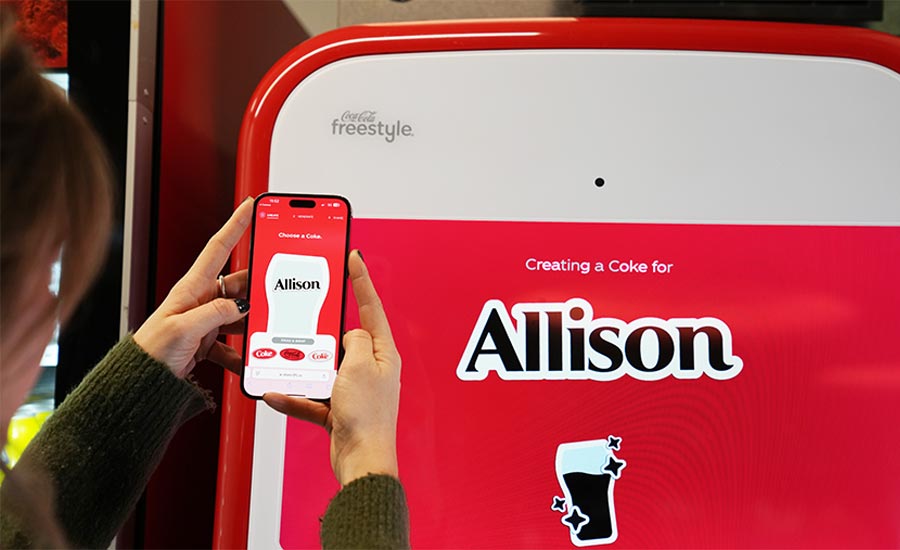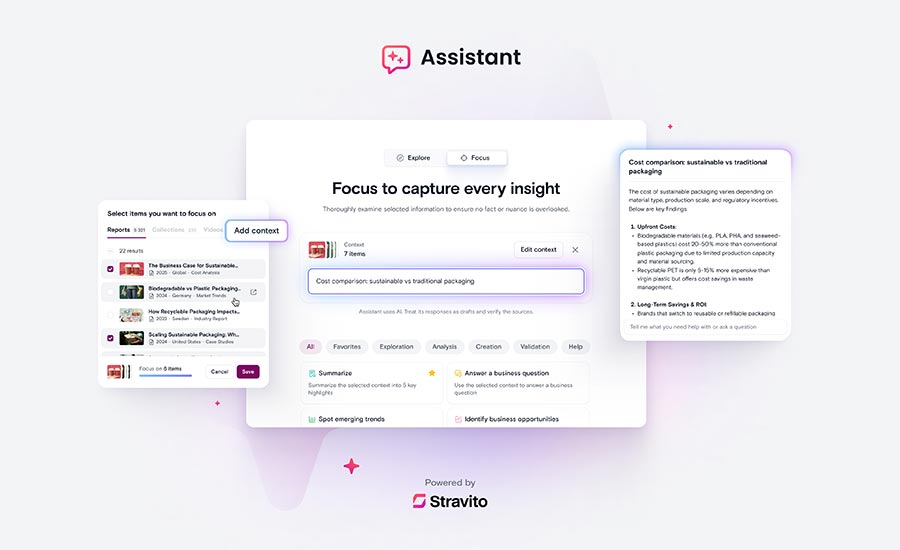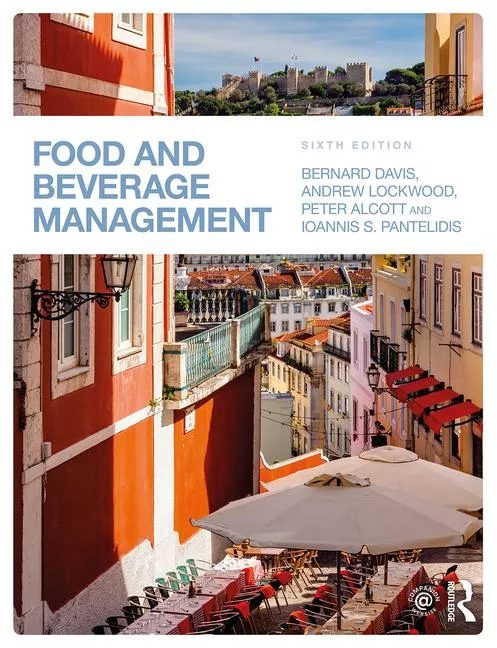Artificial intelligence offers an array of benefits for beverage-makers
Beverage-makers embrace AI for its consumer insights, product prediction properties and more

Image courtesy of Olemedia/iStock/Getty Images Plus via Getty Images
In an early episode of “SpongeBob SquarePants,” Squidward accidentally locks himself in the freezer of the Krusty Krab and travels to the future. While in the future, Squidward begins to panic. He lays on the floor, curls up in a ball and slowly says “Future, future!”
Although there’s no cause to panic, it’s evident that the future is upon us with the ever-evolving technology of artificial intelligence (AI).
Thor Olof Philogène, co-founder and CEO of Stockholm, Sweden-based Stravito, says that AI has rapidly progressed in recent years, especially with generative AI.
“One advancement is its ability to significantly increase the speed and accuracy of market research analysis,” Philogène says. “In Stravito’s case, our AI-powered knowledge management solution enables employees within global organizations to store, discover and integrate market and consumer insights with ease, so businesses can make informed business decisions faster.”
Stravito Assistant, a generative AI-powered tool, offers a conversational way for employees to identify relevant market and consumer insights, he notes.
“Individuals begin in Explore Mode, which helps them uncover what’s already known across their organization’s entire research library,” Philogène explains. “They can then shift into Focus Mode for deeper analysis and execution. This helps individuals quickly move from discovery to decision, further streamlining workflows so teams spend less time searching for and summarizing research and more time applying insights to decision-making.”

Eric Linxwiler, senior vice president at TradeBeyond, San Diego, states that AI advancements have shifted from narrow, rule-based automation to highly adaptive, predictive systems capable of contextual decision-making. Within the food and beverage space, Linxwiler notes that AI goes beyond forecasting and automation and now offers real-time decision support.
“Computer vision systems identify product anomalies in milliseconds,” he says. “Natural language processing tools monitor consumer sentiment across social media and product reviews. Deep learning algorithms are increasingly embedded within supply chain platforms to detect bottlenecks or ESG risks across multi-tier networks, often before they materialize.”
TradeBeyond’s risk management module is an example of an AI-powered tool that enables beverage-makers to identify specific products at risk of failing quality standards, Linxwiler shares.
“These systems prioritize inspection and QA resources toward high-risk items, making quality control more focused and efficient — a critical advantage in the food industry,” he adds.
Shannon Hynds, CEO of Quickcode, McLean, Va., notes that AI technology has progressed at an unprecedented pace that offers “new capabilities that are reshaping supply chains, enhancing trade compliance and driving operational efficiency.”
She lists several areas where AI advancements have impacted the beverage industry, one being real-time trade compliance and tariff management. Hynds calls this a game-changer.
“AI-powered platforms can now track changes to the Harmonized Tariff Schedule (HTS) and other regulatory updates across multiple countries, ensuring that businesses stay ahead of shifting tariffs and trade policies,” she explains. “AI tools can instantly identify how these tariffs impact specific products, recommend alternative sourcing strategies and even predict future regulatory changes. This level of agility is essential for maintaining profitability and avoiding costly compliance errors.”
This feature allows Quickcode to instantly alert beverage companies and help them adjust pricing strategies or sourcing options, if necessary.
“This guarantees compliance while minimizing costs and avoiding expensive penalties,” Hynds says. “The result is not just increased sales and market share, but also a more agile, responsive and future-ready business tool.”
Hynds also points to enhanced supply chain visibility and optimization.
“AI can analyze vast amounts of data from suppliers, logistics providers and market trends to optimize inventory levels, reduce lead times and minimize disruptions,” she says. “For instance, AI can predict potential bottlenecks in the supply chain caused by geopolitical events, natural disasters or labor strikes. Beverage companies can adjust their operations, secure alternative suppliers or reroute shipments to avoid delays when they proactively identify these risks.”

Intelligent product classification, compliance audits and proactive monitoring of regulatory changes are other factors in the industry impacted by advancements in AI, according to Hynds.
“These advancements in AI have been nothing short of transformative to the beverage industry,” she says. “Embracing AI is no longer optional, but is a necessity. Beverage companies who integrate AI into their operations will be better positioned to thrive in this increasingly unpredictable North American supply chain.”
Counting on consumer insights
AI can offer beverage brands insights on what consumers want. Stravito’s Philogène recalls that, traditionally, finding relevant consumer data required hours or days of manual searching, often hindered by siloed or duplicated data.
“With tools like Stravito Assistant, beverage-makers can now instantly identify relevant insights by asking questions such as, ‘How do American millennials feel about immunity-boosting beverages?’ or ‘Which dairy-alternative drinks are growing fastest?’” he shares. “Assistant can answer with insights from trusted data sourced from their company’s entire knowledge base.”
When individuals want a deeper analysis, Philogène says they can select a set of reports, videos or collections on Stravito Assistant, and it will automatically enter Focus Mode enabling teams to compare findings, detect knowledge gaps and uncover themes and patterns.
“This comprehensive analysis can help track shifts in consumer behaviors, benchmark competitive positioning across markets and prepare executive-ready summaries, giving beverage-makers further insight into what their consumers want.”
TradeBeyond’s Linxwiler shares that AI can benefit beverage-makers by decoding complex and evolving consumer preferences by aggregating and analyzing data from social media, loyalty programs, eCommerce platforms and wearable technology.
“Generative AI can simulate hypothetical scenarios, predicting how consumers might react to a new zero-sugar variant of an energy drink or a new sustainable packaging concept,” he suggests.
AI also refines market segmentation, Linxwiler adds.
“For example, machine learning can cluster consumers not just by age or location, but by deeper behavioral traits — identifying, say, a cohort of fitness-focused Gen Z consumers who are likely to favor plant-based protein beverages with immunity claims,” he says. “This allows for hyper-targeted product and marketing strategies. AI brings the ability to conduct behavioral multivariate analysis at a depth not previously possible, helping brands understand and anticipate purchasing drivers with greater precision.”
Quickcode’s Hynds shares similar thoughts regarding how AI analyzes “vast amounts” of consumer data, from social media trends to purchase histories.
“For example, sentiment analysis allows AI to evaluate customer reviews and social media posts to gauge consumer sentiment about specific products or flavors,” she says. “Trend forecasting uses historical and real-time data to predict emerging trends, such as the rise of low-sugar or plant-based beverages.”
Another example Hynds shares, in the context of tariffs on imported beverages, is how AI can assist brands in understanding how price sensitivity might shift consumer behavior.
“Quickcode’s AI tools can track these changes in real-time, enabling beverage-makers to adjust their strategies,” she states. “For instance, if tariffs make premium tequila less affordable, AI can identify opportunities to introduce domestically produced alternatives or highlight value-tier products that align with new consumer priorities. AI also enables personalized recommendations by suggesting new product ideas based on individual consumer preferences and behaviors.”
Such emerging technologies allow brands to make data-backed decisions on formulation, marketing and distribution strategies, Hynds adds.
Boasting the benefits
Although AI offers advantages during new product development, experts share that it does come with some challenges.
Stravito’s Philogène says that, in the beverage sector, GenAI tools like Stravito Assistant can help brands identify insights that allow brands to respond swiftly to emerging trends and product innovation with confidence.
“However, as AI-powered solutions become more prevalent, ensuring the use of trustworthy data is important,” he states. “Transparency is essential when evaluating a generative AI tool’s ability to deliver verifiable insights. Users should not only receive answers, but have clear visibility into the sources behind them.”
For example, Philogène notes that Stravito provides direct source links for seamless fact checking, which ensures users can trust the data that drives their decisions. Companies must be sure they are working with trusted vendors for their AI solutions, he adds, and ensure that the data they use in AI-enabled systems is handled in a secure and compliant manner.
Meanwhile, TradeBeyond’s Linxwiler notes how using AI during formulation speeds up the process. AI analyzes thousands of ingredient combinations, he shares, reducing time-to-market for new flavors or health-positioned drinks and proposing optimal formulations by analyzing large databases of market research and aligning them with both current and emerging consumer trends.
“AI platforms can suggest product formulations that meet both taste preferences and regulatory requirements across markets,” Linxwiler adds.
He uses an example of a brand shifting from cane sugar to stevia in a fruit juice. The brand can use AI to model how this change will not only impact taste, but also affect consumer appeal in different demographics.
“In the beverage industry, where seasonal trends and health fads can emerge rapidly, AI helps R&D teams stay agile,” Linxwiler expresses. “It can also predict ingredient availability risks, helping developers pivot to more stable alternatives early in the innovation cycle.”
One challenge using AI presents is the lack of organized, centralized, real-time data, he notes.
“Beverage-makers in particular often operate with fragmented systems and siloed data, limiting AI’s ability to process, analyze and generate meaningful insights that can influence and optimize strategies,” Linxwiler explains. “Without a unified foundation, AI cannot effectively contribute to product innovation or operational efficiency.”
To overcome this, he says that beverage brands must begin by creating a central repository of supply chain data down to the purchase-order, SKU and factory levels. The manner is urgent because product development cycles can reach 18 months or longer, Linxwiler adds, and an inadequate timeline does not fare well in a rapidly-evolving market.
“The foundation for releasing the benefits of AI lies in a company’s ability to interconnect thousands of proprietary data points from multiple internal sources,” he states. “That includes aggregating data from early-state planning, raw material specifications, supplier audits and compliance documentation, all the way through sourcing, costing, logistics and fulfillment. … Only when this level of interconnected data management is established can AI operate at its full potential, providing accurate predictive analytics and enabling intelligent automations.”
A multi-enterprise platform plays a critical role in optimization supply chains, Linxwiler says. Centralizing data in a single environment and synchronizing inputs from all supply chain partners ensures that the information in these platforms is accurate, timely and actionable, he explains.
Quickcode’s Hynds echoes similar sentiments in terms of the benefits of using AI during new product development. She notes that AI accelerates the process of ideation and testing phases by analyzing data and generating insights quickly, saving both time and resources.
“It reduces costs by predicting successful products and optimizing formulations, minimizing the risk of costly failures,” Hynds says. “AI helps create innovation by identifying gaps in the market and suggesting novel combinations of flavors, ingredients or packaging. It also ensures products are consumer-centric, aligning with preferences and increasing the likelihood of success.”
With the recent surge in tariffs, she states that AI can assist with “tariff engineering,” a legal strategy that helps product developers design goods in a way that avoids higher tariff rates.
“Even minor design adjustments can significantly impact tariff classifications, yet product designers often overlook these considerations,” Hynds adds.
She notes that one of the biggest challenges is data quality, because AI models rely on accurate and diverse datasets to generate meaningful insights.
“If the input data is incomplete or biased, the outputs can be flawed,” Hynds says. “Additionally, while AI can suggest new formulations, sensory perception and consumer testing remain critical for validating AI-driven recommendations. Lastly, integrating AI into traditional R&D workflows requires a significant investment in technology and expertise, which can be a barrier for smaller manufacturers.”
Actively embracing AI
In terms of beverage categories, the experts observe which have been using AI more than others.
Stravito’s Philogène says businesses from an array of industries and categories use its AI-powered tools. Notable customers include Heineken, Pernod Ricard and Danone.
TradeBeyond’s Linxwiler notes that functional beverages are leading in AI adoption, such as energy drinks, protein shakes as well as immunity-boosting drinks.
“These products thrive on rapid innovation cycles and micro-targeted marketing, both of which benefit from AI’s speed and data-processing capabilities,” he says. “Alcoholic beverage companies are also investing heavily. Several global brewers now use AI to analyze flavor profiles during fermentation and automate quality checks to ensure consistency across batches and geographies.”
Quicknote’s Hynds shares that the non-alcohol beverage category, including functional and health-focused drinks, have been at the forefront of adopting AI.
“These companies use AI to develop innovative formulations that cater to health-conscious consumers, predict trends, like adaptogenic ingredients or low-calorie sweeteners, and optimize marketing strategies to target specific demographics,” she explains. “Alcoholic beverage companies are also beginning to explore AI, particularly for personalized recommendations and sustainability initiatives.”
TradeBeyond’s Linxwiler notes that AI plays a pivotal role in traceability, sustainability compliance and recall prevention. For example, he says computer vision tools can verify product labels on high-speed bottling lines, reducing the risk of mislabeled allergen declarations.
“AI is also central to dynamic inventory management, forecasting demand spikes tied to holidays, weather or sporting events, and adjusting distribution plans in real time,” Linxwiler explains. “On the regulatory front, AI platforms can parse complex legislative texts and match them against supplier data, flagging compliance risks before products ship. AI also enhances supply chain chain-of-custody tracking, helping beverage companies stay ahead of complex compliance requirements.”
Stravito’s Philogène shares that Stravito Assistant is able to provide a comprehensive analysis of an organization’s research to help teams track shifts in consumer behaviors, benchmark competitive positioning across markets and prepare executive-ready summaries.
“These capabilities not only streamline decision-making, but also accelerate product innovation and enable more personalized, customer-centric strategies, laying the foundation for long-term growth,” he adds.
Fit for the future
Looking ahead, it is clear that AI will continue to be used in beverage manufacturing.
“The rapid advancements in AI and in particular, Generative AI, are unfolding at an unprecedented pace, and what’s not possible today may very well be just a few months from now,” Stravito’s Philogène says. “Stravito’s focus remains on exploring how we can harness its full potential to address real business challenges using generative AI innovation to enable businesses to continue to quickly transform their market research data into a competitive advantage.”
Quickcode’s Hynds notes that one of the most pressing challenges beverage-makers face is the increasing unpredictability of global trade, especially the impact of tariffs.
“With tariffs on key materials like aluminum, steel and important ingredients and the potential to fluctuate quickly, compliance has never been more important or difficult,” she states. “AI will play a role in this upcoming challenge for beverage manufacturers through real-time tariff monitoring and compliance, accurate product classification, cost optimization through duty management, proactive supply chain adjustments, comprehensive compliance audits, predictive analytics, streamlined documentation and reporting, mitigating retaliatory tariff risks, and empowering strategic decision-making.”
TradeBeyond’s Linxwiler says the market is approaching an era where AI will no longer be an add-on, it will be the central control tower system of beverage development and sourcing.
“With the potential to optimize workflows across the entire value chain, … AI will become central to risk resilience,” he concludes. “As global supply chain sustainability regulations become more aggressive, beverage-makers will rely on AI not just to identify Tier 1 suppliers, but to map ingredients back to their agricultural origins. This will be key in proving ESG compliance and avoiding import bans or reputational damage.”
Share a Coke on Freestyle favors artificial intelligence
Earlier this spring, Coca-Cola Freestyle put a spin on the Share a Coke experience by using artificial intelligence (AI) to personalize the user’s drink experience.
Ellis Chambers, director of marketing at The Coca-Cola Co., Atlanta, calls it “one of the most exciting things” the company has done with its Freestyle platform.
“It brings together AI-powered drink personalization, mobile integration and social sharing in a way that’s never been done before at this scale,” Chambers explains. “It’s a fresh, fun twist on the original Share a Coke campaign, giving people the power to create and share one-of-one drink recipes made for friends, right from the dispenser.”
He says it is the latest example of how Coca-Cola is leaning into experience-driven, tech-enabled solutions that turn something as simple as pouring a drink into a shareable moment, providing a real differentiator for the company’s foodservice partners.
Cindy Pang, senior director of AI transformation at The Coca-Cola Co., notes that when Coca-Cola set out to develop the technology, its goal was to extend the return of the Share a Coke experience in a way that only Freestyle could — by turning connection into something truly personal.
“The result is our AI-powered recipe generator, which lets guests create a custom drink for a friend, complete with their friend’s name, fun stickers and a completely unique flavor blend,” she says. “They can pour it fresh from the dispenser to try it out, then text it to a friend to redeem at their nearest participating Freestyle location — sparking real-time connection, no matter the distance.”
The new campaign is scheduled to end June 2, but Chambers notes that, while most limited time offerings (LTOs) focus on pre-set flavors or seasonal promotions, Share a Coke on Freestyle takes personalization to a new level, making every drink uniquely tailored to each guest.
“By leveraging the proprietary recipe generator that Cindy and her team so expertly developed for Freestyle, Share a Coke on Freestyle delivers a one-of-one custom mix instantly, enhancing guest engagement and driving repeat visits,” Chambers says.
Pang explains how AI personalizes each beverage.
“The user interface that pops up on your phone when you scan the Share a Coke QR code on the dispenser’s touchscreen offers guests a selection of nine stickers, mapped to distinct personalities to choose from, which can be combined to predict a suitable beverage,” she states. “Leveraging real-time flavor availability and the selected brand (Coke, Diet Coke, Coke Zero), the AI-powered recipe generator, trained with data from R&D, selects the appropriate flavors and ratios to craft a uniquely delicious beverage for the guest.”
Chambers says the program is designed to increase both beverage engagement and drive incremental sales, because it fosters organic word-of-mouth and encourages social sharing, which then amplifies brand visibility and deepens customer connection.
“The combination of personalization and engagement boosts sales for our foodservice partners and strengthens the overall relationship between the brand and its consumers,” he adds.
Going forward, Pang says that Freestyle is “an ever-evolving platform.” Share a Coke on Freestyle is just the latest example of how the company is using technology to enhance beverage experiences.
“We will be continuing to innovate and iterate on our AI recipe generator’s capabilities, so expect to see increasingly personalized beverage experiences from Freestyle in the future,” she notes.
Looking for a reprint of this article?
From high-res PDFs to custom plaques, order your copy today!








